Coasties for Life — From Coast Guard to Ferry Captain

By Dawn De Busk
Staff Writer
NAPLES — Stewart Ross Graham, Jr., known to his friends as Ross, retired after 22 years in the United States Coast Guard. Then, he landed a water-based job as the captain of the Frye Island ferry, where he has worked for 30 years.
Graham served on the Coast Guard from 1968 until 1990. For a number of years, he worked at the USCG district building in Boston. Prior to that, in the mid-1970s, he spent a month at a time, out at sea while the cutter he was aboard acted as a satellite to guide planes and other ships.
“In 1968, I went to boot camp in Cape Maine, New Jersey,” he said.
Then, he went to the Loran Station on Kodiak Island, Alaska. The station was also known as Narrow Cape.
During his time in the military, he has witnessed technological advances.
“Back then, we sent signals for navigation. Planes honed in on the signal to navigate,” he explained. “There is no more Loran anymore. Loran is gone. It is all satellites. Back then, they had Coast Guard Loran stations all over the place.”
After being stationed in Alaska, he attended radio school and learned Morse code. Then, he was transferred to Hawaii.
“We communicated with Morse code. I was at a coast guard radio station in Hawaii. Most of the communication was Morse code. We communicated with all nationalities: Russian, Japanese, etc. It was all the same thing — Morse code. Everybody used it. That is no longer used,” Graham said.
“From Hawaii, I got transferred to Southwest Harbor, Maine. My enlistment was about up so I said, ‘Well, if you give me Portland, I will re-enlist.’ So, they transferred me to Portland. I was in Portland for three years.”
During that time, Graham did the commute between his hometown of Naples and Portland.
“From 1975 to 1977, I was on the Coast Guard Cutter Dwayne, which is now an artificial reef off of Florida. It is a 327-foot cutter. It was decommissioned. It’s a reef now,” he said. “It was a WWII vintage cutter. We would go on patrol like law enforcement and the vessels would outrun us. It was time to decommission it.”
“When I was in Portland, they used to do ocean stations. We would go out there off the coast for a month. We would be a satellite station and just drift. We would send out a signal and aircraft from Europe would hone in on our signal. They would call us, the Ocean Station. We would send the weather. They would send their position,” he said.
“From there, I went to the district office in Boston in the Boston Garden. I would ride up in the elevator with the Celtics. They were on one floor, the coast guard district office was on the next floor,” he said.
“I was there for three or four years. Then, went to base in Boston in 1977 for 10 years. We had five stations under Base Boston. Say that Gloucester got a call, ‘Somebody is sinking.’ We would be the center to direct different stations on what to do. It was the radio room. It was like being the dispatcher for the ocean,” he said.
A cutter is defined as a light, fast coastal boat.
“The cutters come in different sizes: a 40-footer, 95 feet or 327 feet. In Boston, they had all big cutters. If it was a local rescue, they would send out the 40-footers, and not a big 327-foot cutter,” he explained.
He did not recall any political happenings or news events of those time periods because he was isolated from those things.
“What I was doing is search and rescue. We have radios, and monitor the radios for distress. The radio room would be secure. As far as knowing stuff outside of the radio room, we didn’t,” he said.
However, he does like to keep current when it comes to fellow ‘Coasties.’ One way is the annual conferences of the Cuttermen’s Association. They meet in Portland.
“It’s an association of all the cutters that were stationed in Portland over the years. You had some in the 1950s, 60s, 70s. It is a gathering of all the crew that served on different cutters over the years,” Graham said. “They called the cutter home but at different times.”
“The conference is about reminiscing what we did when we were on those cutters. They have sea stories, rescues, stuff like that,” he said. “It is a good camaraderie of getting together because we are dropping like flies. We are getting older. Most of them are in their 70s and 80s. We are dwindling.”

